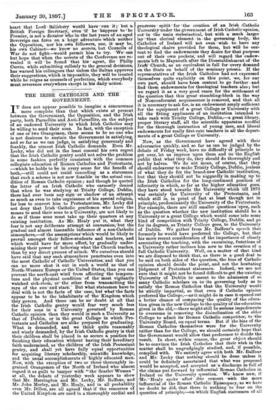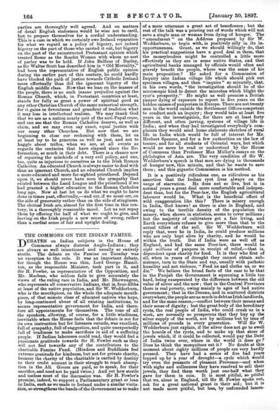THE IRISH CATHOLICS AND LILL GOVERNMENT.
IT does not appear possible to imagine a concurrence more complete than that which exists at present between the Government, the Opposition; and the Irish party, both Parnellite and Anti-Parnellite, on the subject of an endowed University to which Irish Catholics may be willing to send their sons. In fact, with the exception of one or two Orangemen, there seems to be no one who is not desirous to sustain the Government in satisfying, and so far as we can judge, in satisfying generously and frankly, the utmost Irish Catholic demands. Even Mr. Lecky, who did not in the least conceal his own regret that the Irish Catholic gentry could not solve the problem in some fashion perfectly consistent with the common collegiate education of Roman Catholics and Protestants, —which he holds to be in every sense for the benefit of both,—still could not resiet conceding as a statesman that such a scheme is not now feasible in the actual con- dition of Roman Catholit opinion ; and though he quoted the letter of an Irish Catholic who earnestly denied that when he was studying at Trinity College, Dublin, there had ever been any sign ,or 'shadow' of an attempt so much as even to take cognisance of his special religion, far less to convert him to Protestantism, Mr. Lecky did not deny that Irish -Catholic gentlemen who have the means to send their sons to a University, are not likely to do so if those sons must take up their quarters at any existing institution. As Mr. Healy put it, what they fear is not any deliberate attempt at conversion,'but the gradual and almost insensible influence of a non-Catholic atmosphere,—of the assumptions' which would be likely to prevail amongst their fellow-students and teachers, and which would have far more effeet, by gradually under- mining their power of believing what the Church teaches, than by any direct process otattack. We ourselves should have said that any such atmosphere penetrates even into the most Catholic of Catholic' Universities," and that you can no more shut it oat in such a 'world as that of North-Western Europe or the United States, than you can prevent the north-east witid from affecting the tempera- ture and the physical condition ' of the most vigilantly watched sick-room, or the ether from transmitting the rays of the sun' and stars. ' But what statesmen have to deal with is not the facts of the case, but what the fadts appear to be to the inhabitants of the Kingdom which they govern. And there can be no ' doubt at all that the Irish Catholic gentry would fear very much less for their sons in a University governed by Roman Catholic opinion than they would insuch a University as that of Dublin, or in the great College in which Pre,- testants and Catholics are alike prepared for graduating. What is demanded, and we think quite reasonably and wisely demanded, by the Irish Catholic gentry is that their children shall be placed in as secure a position for finishing their education without having their hereditary faith undermined, as the children of the Irish Protestant gentry, and shall yet have fully equal opportunities for acquiring literary scholarship, scientific knowledge, and the usual accomplishments of highly educated men. Now, with the exception of two or three thoroughly in- grained Orangemen of the North of Ireland who almost regard it as guilt to tamper with "the Scarlet Woman" at all, the debate of -yesterday week appears to show that Mr. Harrington and Mr. Lecky, Mr. Balfour, .and' Mr. John Morley, and Mr. Healy, and in all probability even Mr. Dillon, are all agreed that if the resources of the United Kingdom are used in a thoroughly cordial and generous spirit ' for the creation of an Irish !Catholic University under the gbyernment of Irish Catholic opinion, not.in the main ecclesiastical, but with a much ,larger lay' 'than- clerical elemebt in , the governing body,. the Catholics of Ireland will not even wish. to have any theological chairs provided for them, but will be con- tent to find the endowments they desire for that purpose out of, their own- pockets; and will regard the endow- ments' left to Maynooth after the Disestablishment of . the Irisi .Church, as an equivalent in full for 'every demand on the State on behalf of the seminary priests If the representatives of the Irish Catholics had not expressed themselves quite explicitly on this point, we, for our own part, should have: been content to go further , and find them endowments for theological teachers. also ; bat we regard it as a very good omen for the settlement of the question that this great stumbling-block in, the way of Nonconformist acquiescence is removed, and that. all it is necessary to ask for, is an endowment amply sufficient for the equipment of a. great College or University with all the fitting appliances of an institution intended to take rank with Trinity College, Dublin,—a great library, proper literary staff, all the scientific apparatus needful for the thorough instruction of young men and liberal endowments for really first-rate teachers in all the depart. ments of a great College or University.
Nol,' 'as the Government have agreed with their adversaries quickly, and so far as can be judged by the debate of Friday week, have no difficulty of principle to get over, let us impress upon them and on the English public that what they do, they should do thoroughly and not by halves. We 'do net mean, of course, that they should endeavour to make Trinity College, Dublin, jealous of what they, do for the' brand-new catholieinstitution, but that they shonld not be niggardly in making up 'tb the Irish Catholics for the long-continued position of inferiority in which, so far as the higher education goes, they have stood towards the 'University which till 1873 was certainly the University of the' Protestants, and which still is, in point of fact at least though not in principle, predominantly the University of the Protestants. For example, there are still' smaller questions 'open, such as the question whether the new institution shduld be a University or a great College which would come into some kind of competition with Trinity College, Dublin, and go for its degrees, as Trinity College goes to the University of Dublin. We gather from Mr. Balfour's speech that formerly he would have preferred the College, but that his more recent consideration of the importance of closely associating the teaching, with the examining, functions of a University rather inclines him now to the ,ereation of a full Catholic University. Well, on a matter of that kind We are disposed to think that, as there is a. good deal to be said on both sides of the question, the bias of Catholic opinion should decide the point, and not the hesitating judgment of Protestant statesmen. Indeed, we 'are not sure that it might not be found difficult to get theexisting 'University of Dublin to' assent to the admission of so many Catholic scholars on to its governing body as to satisfy the Roman Catholics that the University would be 'strictly impartial, so that even if Catholic 'opinion preferred the College,—a- it might do in case it opened out a better chance of comparing 'the quality of the educa- tion given in the new College to the quality of the education given in the old,—there might still be serious impediments to overcome in removing the disinclination of the older College to admit its Roman Catholic competitor, to the University Board, on equal terms. But if the bias of the 'Roman Catholics themselves *ere for the University rather than for the College, we should certainly hope that the Government would allow that preference to decide the 'result. In short, within reason, the great object should be to convince the Irish Catholics that their wish in the matter shall be ungrudgingly studied, and, if possible, complied with. We entirely agree with both Mr. Balfour and Mr. Lecky that nothing should be done unless it could be definitely' ascertained that what was proposed would be accepted, and accepted as' a discharge in full of the claims put forward by influential Roman Catholics in Ireland on the University question. We know now, if Healy spoke after due concert -with the more 'Influential of the Roman Catholic Episcopacy, as we have no doubt he did, that there is nothing 'to fear on the question of principle,—on-which. English statesmen of all parties are thoroughly well agreed. And on matters of detail English statesmen would be wise not to cavil, but to prepare themselves for a cordial understanding. This is a case in which we certainly owe Ireland reparation for what we regard as a policy of bigotry, not indeed bigotry on the part of those who carried it out, but bigotry on the part of the uninstructed Protestant opinion which treated Rome as the Scarlet Woman with whom no sort of parley was to be held. If John Balfour of Burley, as Sir Walter Scott has described him in "Old Mortality," bad been the representative of English public opinion during the earlier part of this century, he could hardly have blocked the path of justice towards Catholic Ireland more effectually than did the ignorant bigotry of the English middle class. Now that we lean on the masses of the people, there is no such insane prejudice against the Roman Church, which, in Protestant countries at least, stands for fully as great a power of spiritual good as any other Christian Church of the same numerical strength, for it gains in devoutness and grandeur of tradition what it may lose in intellectual realism. We may thank God that we are as a nation nearly quit of the anti-Papal craze, and can see that the Roman Catholics deserve, as well as claim, and we may even say exact, equal justice with our many other Churches. But now that we are beginning to close our reckoning with them, let us at least try to be generous as well as just, and not to haggle about trifles, when we are, at all events as regards the centuries that have elapsed since the Re- formation, so much in their debt. There is a chance now of repairing the mischiefs of a very evil policy, and one, too, quite as injurious to ourselves as to the Irish Roman Catholics. An educated Church is always easier to deal with than an ignorant Church, and an educated Church implies a more educated and more far-sighted priesthood. Depend upon it, we should never have seen the sympathy that existed between the Land League and the priesthood if we had granted a higher education to the Roman Catholics long ago. Now at last let us do what we ought to have done in times past, effectually,—and err, if we must err, on the side of generosity rather than on the side of stinginess. The clerical Irish are, almost for the first time in this cen- tury, in a thoroughly reasonable mood. Let us not repay them by offering the half of what we ought to give, and leaving on the Irish people a new sense of wrong, rather than a cordial sense of fair and upright dealing.



















































 Previous page
Previous page